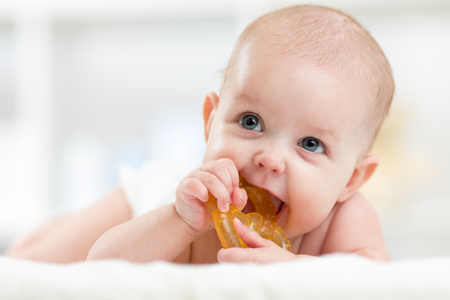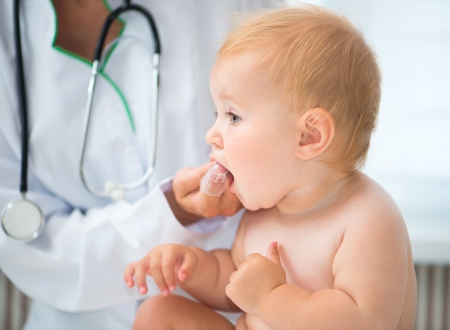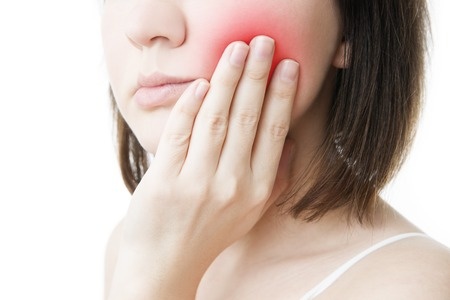Your little one is almost six months and somewhere around this time, you will notice that he has started putting everything in the mouth. This includes mostly the non edible and not so clean items of the house, mostly because he is now teething. Now is the time to move away all the dangerous items from their reach and keep the house dirt and germ free. Your little baby is also on the move now and loves exploring his surroundings.
This habit of putting toys in the mouth stems from the developing sense of the type of objects. They feel everything through their mouth. Another very important reason which often gets overlooked is “teething”. Teething is a normal phenomenon and will happen at its own speed. You should avoid stressing if your 8 month old is yet to get his little teeth. They will be here sooner or later.

When do Babies Start Teething?
Teething in babies occurs between 4 to 7 months of age. The baby first gets a temporary set of teeth or milk teeth. These are 20 in number and erupt completely by the time the child turns 3 years of age. Then around the age of 7, the milk teeth begin to fall in their order of appearance and are replaced by permanent teeth which are 32 in number. If your baby is teething, then the gums get swollen and itchy before the teeth actually break out. To soothe the itching, they put things in their mouth. This may lead to infections and at times loose motions.
Most of the babies will follow this teething pattern but there are times when the teething is delayed or abnormal. Abnormal teething can occur due to minor problems like a new tooth erupting in the way of another tooth, impacted tooth which causes pain because the position is such that it cannot erupt. Absence of tooth, broken or crooked tooth may be seen in some children. In case your baby has not got any of the milk teeth by the age of 18 months, then you should consult the doctor,
Signs of Teething
- Putting everything in the mouth is one of the early teething symptoms.
- Desire to bite things, toys and clothes
- Drooling. The excessive saliva secretion may lead to a teething rash on cheeks, chin and lips.
- Redness, swelling and tenderness of the gums just before the tooth erupts. This can make the child cranky and irritable.
- Decreased appetite as the teething baby refuses to eat on account of the pain
- Diarrhea or frequent watery stools due to a mild infection
- Rubbing of ears due to an earache.
Most of these common symptoms of teething are seen a few days before the tooth is going to erupt and tend to go away on their own once the tooth breaks out from the gums.
If the child has fever and cold like symptoms during teething, they are most likely to be unrelated to the teething and will go away on their own. In older kids, toddler fever teething may be confused at times since the child will be cranky and rub his ears all the time.
How To Help Your Teething Baby?
When you notice the above symptoms and you feel that your baby is teething, you can try these tips and home remedies to soothe your baby.
- Everyday in the morning clean your baby’s gums and tongue with a clean washcloth. Rub and massage the gums so that the pain and swelling go down. At the time of teething babies like a gentle pressure and rubbing on their gums. Keep the washcloth in a box after washing it as you don’t want it lying around and becoming the source of infection for the baby.
- Offer your baby a teething ring. Teether for baby are quite popular and easily available. Silicone rings are also available. Make sure whatever tether you buy is of good quality and safe for the baby. You should choose the ones that are BPA free. Follow the instructions and sterilize the tether before you give it to the baby. Water filled tethers are available which can be cooled and given to the baby for teething relief. Frozen washcloths can also be a good alternative.
- You can give the baby large pieces of a cold fruit or vegetable to chew on. The coldness will help to bring down the swelling of the gums.
- If the pain and swelling is too much, you can give your baby acetaminophen with the permission of your treating doctor.
- Baby teething gel and teething medicine may be prescribed by the doctor wherever necessary.
- Teething and diarrhoea are co-related. Many babies develop diarrhea at the time of teething. This is mainly because of a mild infection that the baby catches when he puts everything in his mouth. You must modify the diet at this time. Boil the baby’s drinking water very nicely and sterilize the teethers and other toys by washing them in hot water.
- Once you have understood what all you can do for the baby, here is a list of things that you should never use for a teething baby-
- Never give aspirin to a baby
- Never apply alcohol to the baby’s gums
- Never allow your baby to chew hard plastic toys as they can be a choking hazard as well as a source of infection.
- Never given frozen objects to the baby to put in the mouth. You can cool a water tether but not freeze it.

Caring For The New Teeth
Your baby’s teeth are finally here. The first ones to appear will be the lower two middle teeth followed by the upper two. You will enjoy the cute toothy smile a lot these days.
Good oral hygiene should begin from the day your baby gets his first tooth. Make a practice of cleaning the gums and teeth with a washcloth after each meal. Fluoride has known to be very effective in terms of reducing tooth cavities. The supplementation of fluoride for the child must always be done after checking the water source and the fluoride content in it. Excess fluoride intake can lead to permanent staining of the teeth called fluorosis. The most vulnerable age group for this is between one and three. So you must avoid using a fluoridated toothpaste for your child.
To maintain the teeth and prevent cavities, you must never give the baby a bottle in the crib. If the baby drinks to sleep, some amount of milk stays in the teeth all night and gives rise to cavities. Also you must avoid giving sugary foods in the night and fruits that may stick in the teeth like raisins, dates etc. If the food lodgment is not cleaned properly, it can lead to tooth decay.
Get a baby brush for your little one and develop the habit of brushing daily twice a day. You can start this once the child has got most of the teeth around the age of one. Before that there is no need to use a brush, you can just clean the teeth with an infant tooth cleaner or a clean washcloth.



